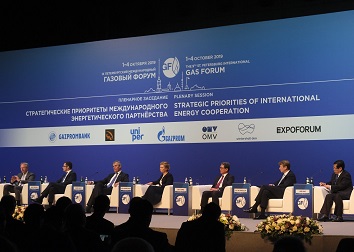
Participants of the SPIGF 2019 Plenary Session discussed global cooperation priorities of the gas sector.
Gas is the most environmentally friendly energy resource that is highly marketable across the globe. However, its global distribution requires that industrial companies combined their efforts to reduce hydrocarbon emissions and develop the transporting infrastructure. These were some of the conclusions made by the speakers at the plenary session Strategic priorities of international energy COOPERATION that took place on Day 3 of the 9th St. Petersburg International Gas Forum at ExpoForum Convention and Exhibition Centre.
Elena Burmistrova, Deputy Chairman of the Gazprom Management Committee, CEO of Gazprom Export, specified in her speech one of the key challenges within the industry, which comes out when oil and gas companies try to fit the existing regulations to their business needs. She believes that such approach impairs both the economical and the legal system, as well as the investment climate, and moreover, it dents the sector’s reputation. "Investors are easy to scare away and hard to engage again," the head of the company shared her opinion.
The speaker didn’t disregard the ecological issues, either: "We have to approach it cold-minded. CO2 emissions can't be reduced by zero in an instant – it will cause thousands of people lose their jobs, and that’s not the result anybody wants."
Mario Mehren, Chairman of the Board and CEO at Wintershall Dea GmbH, supported her and said that the industry has to strife towards solving the climatic changes. "Germany decided to abandon coal, and it helped us to reduce CO2 emissions by 20% annually. This is a good result, considering the fact that German industry is one of the most advanced," the speaker shared their experience.
Besides, he encouraged industry insiders to cooperate, as this is the only way to reach success. In conclusion, he spoke of their fruitful collaboration with Gazprom – not only as regards to hydrocarbons recovery and their transportation, but also in terms of joint projects and staff training.
Joe M. Kang, President of International Gas Union said that shifting to the new energy policy wasn’t going to be easy, as if with a wave of a magic wand. The only way to do it is to refer to innovation and technology, and all the parties concerned have to collaborate in their development.
"In the 15th century, they used to sacrifice children and teenagers in Peru for gods to cease climate changes. Today, young people speak about the climatic catastrophe themselves, and that is a challenge for us," President of International Gas Union said. He believes that wide public should be engaged into this dialogue, because otherwise there is no sense in discussing those issues.
Ulf Heitmueller, Chairman of the Executive Board at VNG AG, mentioned that the energy paradigm in Europe is changing, coal and nuclear energetics giving way to gas. According to him, uncovered gas demand in Europe is about 120 bln m3, and it can be satisfied by Russian suppliers. That’s why the company sets high value on their collaboration with Gazprom that has been going on for 46 years.
Maarten Wetselaar, Integrated Gas & New Energies Director, Member of Executive Committee at Royal Dutch Shell plc, believes that despite all the progress in terms of carbon dioxide emissions, the industry should come to rest on its laurels yet. "William Herschel discovered how measure temperature of light. Many would have stopped there, but not him. Herschel directed light beyond the red portion of the spectrum, thus discovering the infra red radiation. We really should follow his example: think globally and not result assured that we’ve discovered everything we could already. We should proceed," the speaker encouraged his colleagues.
In his report, Maarten Wetselaar touched on the subject of hydrogen technology: "Hydrogen can pave a way for gas that will be used for hundreds of years. In California, we’re currently arranging a Shell network comprising 64 hydrogen fuel stations. In Japan, a new hydrogen-powered ship is underway, for hydrogen to fuel the Olympics Torch."
Rainer Seele, Chairman of the Executive Board and CEO at OMV AG stated that the European Union doesn’t invest into the gas infrastructure development and even blocks third-party investments. "Gazprom is ready to invest into the infrastructure, and we’re sharing risks. If some third parties attempt to interfere with our investment proceedings, we really should reconsider the terms of our partnership," he said. The speaker mentioned that the European market is longing for import, and that is why suppliers will have to offer competitive conditions and invest into diversification of supply ways. The expert is sure that such scenario of oil and gas resources depletion is unreal, and that companies will proceed to recover oil and gas, as these are the best fossil fuels.
Ling Xiao, Vice President at PetroChina Company Limited, told the participants of the session about the prospects of the Chinese sales market. "China is going to observe the Paris Agreement on Climate Changes. Our country is the leader in terms of emissions, and gas will help us to change that. By 2020, the share of gas in the primary consumption structure will be 10%, and by 2030 it will be 15%," he announced. According to the expert forecast, by 2035 China’s demand for gas will be about 24% from the global demand, and the requirement for this energy resource will be 610 bln m3 by 2035, and 900 bln m3 by 2050.
Finally, Ling Xiao shared China’s accomplishments in the energy business, the main of which is the project Arctic Energy Pearl: it resulted in putting into operation three new facilities, and now two Chinese companies have got 10% share from all recovery in the Arctic Region. He also mentioned that the soon-to-be start of gas supplies along the joint Russia-China gas pipeline POWER OF SYBERIA is a historical landmark, as this pipeline will provide gas to all the North-East and East China.